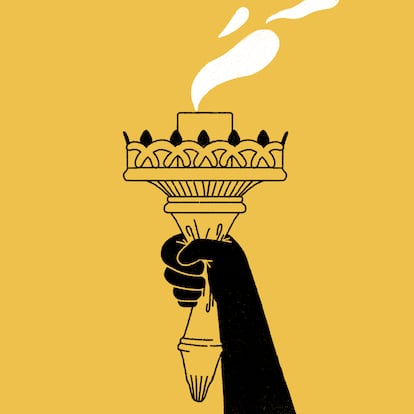Jordan Neely, the castaway in a subway car
I learned in New York that the deranged homeless man who keeps silent in his bubble of invisibility can be ignored without annoyance. The one who breaks into speech and screams becomes a menace

In the midst of the noise and the crowds there are deranged people who live in New York as if on a desert island on which they have spent many years without any human contact. There are those who cover their heads with a hood so large and so low over their eyes that their features are indistinguishable. The hood is a cave and they live crouched in the depths, in a darkness that cannot be reached by daylight, nor perhaps by the sound of voices. Every time I read The Mysterious Island, the character that impressed me the most, apart from the revived Captain Nemo, was a sailor named Ayrton, who was left alone on an uninhabited island for five years, after which he had lost his mind and even the use of speech, reduced by the lack of human company to a hoarse grunting and barking animalism. Almost all the castaways who haunt the streets and the stations and trains of the New York subway are mentally ill people that no one cares for, but their clinical condition is undoubtedly exaggerated by the harshness of life outdoors in a city of very cruel winters, and by a particular form of loneliness that is that of those who, being surrounded by people, never receive anyone’s gaze, nor have an answer if they raise their voice.
Even in the less insecure years in New York one quickly learned to look out of the corner of one’s eye, to look without appearing to be looking, so as to detect in advance not a possible danger, but a simple discomfort. Thus, when a few meters ahead, in the middle of one of those generous sidewalks of the city, there was a peddler waving his paper cup, or someone with an alarming appearance, one turned aside in time and quickened one’s pace, without seeming to do so to avoid the other, as if one had not really seen him. On the subway platform it was enough to tilt one’s head to know if there was someone disturbing behind, because from time to time the news was published or the rumor spread that there were malevolent or demented people who pushed some unwary person against the tracks at the moment when the train arrived, with that metallic clatter that always seems to announce the advent of a disaster.
But the instant, distracted supervision that one learned before was that of the subway car at the moment of entering. It could happen that in a crowded train one discovered a whole row of free seats, and rushed to sit down in one of them. And it was only when seated that one would realize the novice trap into which one had fallen, on seeing, and often smelling too, the traveler who was the cause of all that free space: a man, almost always a man, and almost always black, lined with rags and garbage bags, sleeping with his legs spread against a corner, or lying on several seats, surrounded by his filthy belongings, giving off an odor not of stable or dump, but of cesspool, of urine and sweat and accumulated human shit. The stench sharply marked the scope of the island of solitude on which this man dwelled. Fingers with long dirty fingernails emerged from winter gloves improvised with rags. The face was always hidden under the hood, at the bottom of a cave of misanthropy and madness.
As social creatures, our identity is largely shaped by our dealings with others. If we are not spoken to or listened to, we gradually lose the use of speech. If we are not looked at, we become invisible. A ghost is someone whom others have agreed not to see. In New York’s implicit social code, and in official safety recommendations, a cardinal precaution is to avoid the gaze of anyone who appears threatening. When cell phones became widespread, the only users of New York’s often gutted phone booths were beggars and the mentally ill, who rummaged through the boxes for change and used the useless earpieces to engage in long diatribes with unseen interlocutors. In New York, as in Madrid, sane people walk down the street talking loudly on their cell phones with the gesticulations of old-fashioned madmen. When I returned to Madrid, something that always surprised me was the absence of that population of mental castaways to which I had become accustomed in my other city. There are some now, just as there are also those common-looking people who furtively rummage through garbage containers, ashamed homeless people with their shopping carts looking for food when it’s already dark and there are no people left on the street.
The deranged person who keeps silent in his bubble of invisibility can be ignored without disturbance. The one who breaks into speech and shouts becomes a threat, even if he is not addressing anyone. I have in New York many times seen black men talking to themselves, moving very fast, with angry gestures, reproaching someone they do not see, piling interjections one after the other, in a fierce fight in which there is no adversary, with an impotent fury that exhausts itself in itself. That’s why I have no trouble at all imagining that homeless man, Jordan Neely, in a carriage on the F line, standing among the people who pretend not to see him, who turn away from him little by little, contracting in their seats, their faces expressionless, their eyes absent, while he raises his voice above the noise of the train and gradually lights up as he hears himself, though his words seem to ring inside a glass bell. He is 30 years old and has been living on the streets for half his life. He earned pocket change doing Michael Jackson impersonations on the tourist-filled sidewalks of Times Square. When he was 14, his mother was murdered by a lover who left her dismembered body in a suitcase on the side of a Bronx road. Witnesses who seemed not to hear or see anything have reported what he kept shouting, “I don’t have anything to eat. I want water. I don’t care if they lock me up in jail for life. I’m willing to die.
His fate could have been that of so many mentally ill people: the police arrest them for any reason, take them to the terrible Rikers Island remand prison, and since they cannot pay bail they are locked up, which aggravates their disorder and thus provokes new punishments, among them the endless tunnel of the isolation cells, from where there is no return to sanity.
Jordan Neely was forever silenced by a passenger in the same carriage who, instead of acting distracted, felt like a hero and threw him to the floor, pinning him to the ground with a muscular lever against his neck, with all the technical prowess of a vigorous twenty-four-year-old ex-Marine. As Neely resisted and kicked, a few volunteers soon joined in the feat. When the train stopped, Neely’s mouth hung open and his eyes rolled back in his head. Perhaps he did not have time to realize that the invisibility of ghost and castaway against which he wanted to raise his voice was also his only refuge.
Sign up for our weekly newsletter to get more English-language news coverage from EL PAÍS USA Edition
Tu suscripción se está usando en otro dispositivo
¿Quieres añadir otro usuario a tu suscripción?
Si continúas leyendo en este dispositivo, no se podrá leer en el otro.
FlechaTu suscripción se está usando en otro dispositivo y solo puedes acceder a EL PAÍS desde un dispositivo a la vez.
Si quieres compartir tu cuenta, cambia tu suscripción a la modalidad Premium, así podrás añadir otro usuario. Cada uno accederá con su propia cuenta de email, lo que os permitirá personalizar vuestra experiencia en EL PAÍS.
¿Tienes una suscripción de empresa? Accede aquí para contratar más cuentas.
En el caso de no saber quién está usando tu cuenta, te recomendamos cambiar tu contraseña aquí.
Si decides continuar compartiendo tu cuenta, este mensaje se mostrará en tu dispositivo y en el de la otra persona que está usando tu cuenta de forma indefinida, afectando a tu experiencia de lectura. Puedes consultar aquí los términos y condiciones de la suscripción digital.









































